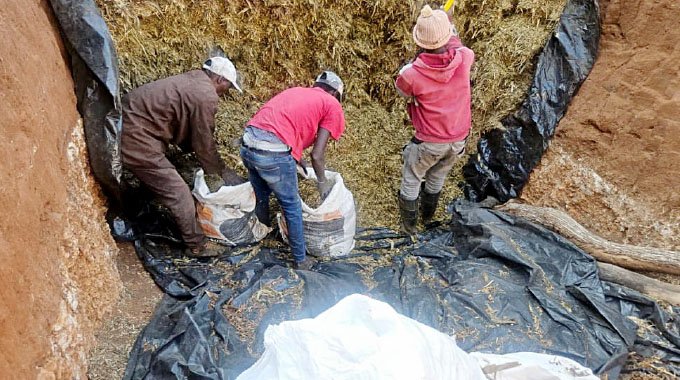Theseus Shambare recently in BeitbridgeON a hot afternoon in Beitbridge, Mr Rueben Ndou leans against a sturdy wooden fence, watching a pen of well-fed cattle chewing lazily in the shade He smiles knowingly.“I have raised my children who are now in different professions, from the proceeds of this project,” he said proudly “We are also teaching our children so that they inherit this as a legacy.”To the casual visitor, Aluwani Farmer Learning Centre in Chief Matibe’s area in Beitbridge East, may look like any other rural farming compound, but behind its fences lies a finely tuned agricultural machine; one that turns grass, grain and water into steady income, food security and a new way of life.The feedlot that feeds families At the heart of this operation, which was established in 2013, is the three-month pen-fattening cycle.More than 30 cattle at a time are fed a scientifically balanced diet of urea-treated crop residues, Panna grass, bana grass, lab and fermented beans — all grown on-site.Each beast fetches an average of US$1 500 when sold With 35 cattle sold per cycle, the centre generates about US$52 500 every three months
That money sends children to school, supports household incomes and funds expansion.“We want to make sure no livestock dies here,” said Mr Ndou “That is why we grow our own feed and plan ahead for the dry months.” Horticulture: The daily bread While cattle bring in big paydays every quarter, tomatoes, leafy greens and other vegetables provide weekly income.The centre’s horticulture plots — green and thriving under the Beitbridge sun, thanks to drip irrigation — supply fresh produce to local markets.“Vegetables keep the cash flow alive between cattle sales,” explained committee member, Mr Sylvester Matabire “They are the heartbeat that keeps the project running.” Fish ponds: A bonus streamTwo large fish ponds shimmer behind the gardens, teeming with tilapia A third pond is nearly ready.Fish sales may not match cattle revenue, but they add another income stream and supply nutritious food to the community
Wastewater from the ponds is also used to irrigate the gardens — a smart reuse of resources in this dry region Feed production: Cutting costs, boosting profitsBeyond growing crops for the market, the farmers cultivate maize, panna grass and legumes, specifically for feed This reduces the cost of pen-fattening while improving cattle weight gain.Livestock manure is then returned to the fields, creating a closed-loop production system Changing mindsets, creating futuresFor Mr Matabire, the project is about more than just the profits
“We want to remove the mindset of our children crossing the border to South Africa in search of jobs,” he said “We want them to be employers, using the land here.”The centre regularly trains farmers from surrounding communities One graduate, Cephas Ngulube, now runs his own 10-hectare farm using skills learned at Aluwani.A visit of encouragement During a recent visit to Aluwani, the Agricultural and Rural Development Advisory Services (Ardas) acting chief director Mr Leonard Munamati, was impressed by the centre’s integrated approach.“This project is quite interesting They have a horticulture section producing tomatoes and vegetables, two active fishponds with a third on the way and a well-managed pen-fattening programme supported by their own urea-treated feed
When farmers come here to learn, they go back to their households and put these lessons into practice,” he said.Mr Munamati applauded the dedication of both the farmers and the Ardas business advisors supporting them He noted that their ability to grow multiple fodder crops, manage their livestock efficiently and plan for the future made Aluwani a model worth replicating.“They have the space, the resources and the vision to grow Expanding their irrigation, fencing the entire property and investing in improved equipment could take them to another level.“We are linking them to banks such as AFC, so they can secure the capital they need,” he said Eyes on expansionThe farmers aim to increase their feedlot to 75 cattle, expand irrigation and fence the entire property
With support from Ardas and other partners, they believe those goals are within reach.Aluwani Farmer Learning Centre is proof that with organisation, innovation and training, rural farmers can transform their livelihoods.It is a model where horticulture feeds the people, fish ponds feed the gardens, gardens feed the livestock and livestock feed the future.As Mr Ndou watches another cycle of cattle grow fat in the feedlot, he is a proud man “This project has built our homes, educated our children and given us hope That is why we will protect it — for the next generation.”Share on FacebookPost on XFollow usSave
Originally published on Zimbabwe Herald
All Zim News
All Zim News is a central hub for all things Zimbabwean, curating news from across the country so no story is missed Alongside aggregation, our team of nationwide reporters provides real-time, on-the-ground coverage
Stay informed and connected — reach us at admin@allzimnews.com.
